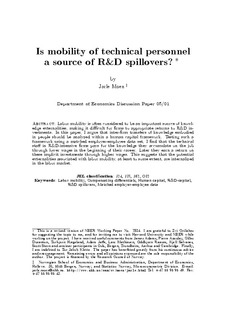| dc.contributor.author | Møen, Jarle | |
| dc.date.accessioned | 2006-08-15T12:05:50Z | |
| dc.date.available | 2006-08-15T12:05:50Z | |
| dc.date.issued | 2001-03 | |
| dc.identifier.issn | 0804-6824 | |
| dc.identifier.uri | http://hdl.handle.net/11250/162904 | |
| dc.description.abstract | Labor mobility is often considered to be an important source of knowledge
externalities, making it difficult for firms to appropriate returns to R&D investments.
In this paper, I argue that inter-firm transfers of knowledge embodied
in people should be analyzed within a human capital framework. Testing such a
framework using a matched employer-employee data set, I find that the technical
staff in R&D-intensive firms pays for the knowledge they accumulate on the job
through lower wages in the beginning of their career. Later they earn a return on
these implicit investments through higher wages. This suggests that the potential
externalities associated with labor mobility, at least to some extent, are internalized in the labor market. | en |
| dc.format.extent | 556436 bytes | |
| dc.format.mimetype | application/pdf | |
| dc.language.iso | eng | en |
| dc.publisher | Norwegian School of Economics and Business Administration. Department of Economics | en |
| dc.relation.ispartofseries | Discussion paper | en |
| dc.relation.ispartofseries | 2001:5 | en |
| dc.subject | labor mobility | en |
| dc.subject | compensating differentials | en |
| dc.subject | human capital | en |
| dc.subject | R&D-capital | en |
| dc.subject | R&D-spillovers | en |
| dc.subject | matched employer-employee data | en |
| dc.title | Is mobility of technical personnel a source of R&D spillovers? | en |
| dc.type | Working paper | en |
